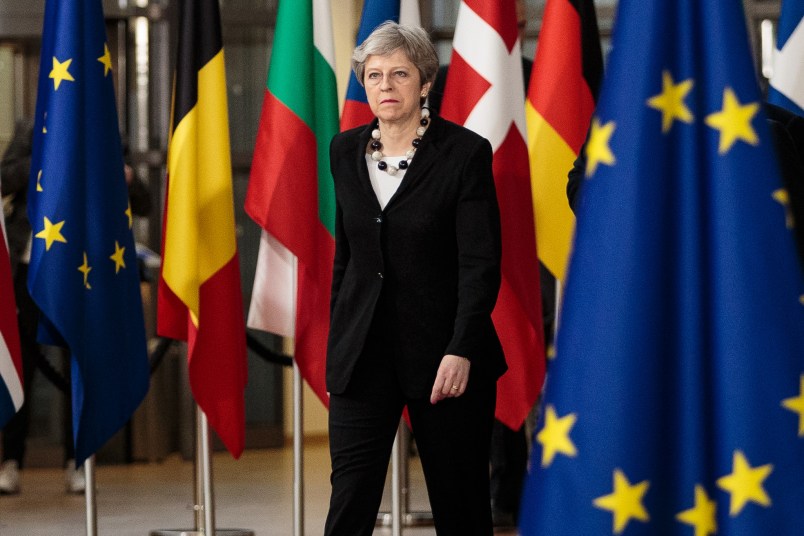BRUSSELS (AP) — The European Union is recalling its ambassador from Moscow for consultations over the nerve gas attack against a former spy in Britain earlier this month, reinforcing a united stand with Prime Minister Theresa May against Russia.
After the EU firmly sided with May in the escalating conflict reminiscent of the Cold War and said it was “highly likely Russia is responsible” for the attack on Sergei Skripal, Dutch Prime Minister Mark Rutte said the EU envoy “is being recalled for consultations to Brussels.”
May won the backing of 27 other EU leaders at a summit Thursday and the bloc called the attack a “grave challenge to our shared security.”
The EU states said they would “coordinate on the consequences to be drawn in the light of the answers provided by the Russian authorities.”
May was delighted with the support early Friday. “This is about us standing together to uphold our values against the Russian threat,” she said.
Rutte said no sanctions were actually discussed at the summit even though rumors swirled of more drastic diplomatic measures. President Dalia Grybauskaite of former Soviet state Lithuania said she was considering expelling Russian diplomats in the wake of the March 4 attack.
Rutte said over the coming days or weeks, “we and our partners must see what the logical next steps are.”
He insisted that any measure “must have an added value to this extremely strong political declaration.”
The unanimity was a victory for May. She had been striving at a summit in Brussels to persuade her EU colleagues to unite in condemning Moscow over the attack on Skripal, a former Russian military intelligence officer convicted of spying for Britain, and his daughter, Yulia.
Russia strongly denies responsibility and has slammed Britain’s investigation.
During a summit dinner, May laid out the reasons Britain is convinced Moscow was behind the attack, including the type of poison used — a Soviet-developed nerve agent known as Novichok — and intelligence that Russia has produced it within the last decade.
Britain argues the attack is part of a pattern of behavior by an increasingly assertive Russia whose muscle-flexing, cyber-meddling and law-breaking on foreign soil pose a threat to the international rule of law.
May said Thursday that “it is clear that the Russian threat doesn’t respect borders.” She said “the incident in Salisbury was part of a pattern of Russian aggression against Europe and its near neighbors, from the western Balkans to the Middle East.”
But European politicians and leaders varied in how far they were willing to go in blaming the Kremlin.
Russia President Vladimir Putin’s office said Thursday that Greek leader Alexis Tsipras had called Putin to congratulate him on his re-election and discuss issues, including the Salisbury poisoning.
Britain and Russia have expelled 23 of each other’s diplomats in a dispute showing no sign of easing.
Russia’s ambassador to the U.K., Alexander Yakovenko, accused the U.K. Thursday of having a “bad record of violating international law and misleading the international community.”
“History shows that British statements must be verified,” he told reporters in London, demanding “full transparency of the investigation and full cooperation with Russia” and the Organization for the Prohibition of Chemical Weapons.
___
Associated Press writers Lorne Cook in Brussels, Nataliya Vasilyeva in Moscow and Danica Kirka and Greg Katz in London contributed to this report.







May won the backing of 27 other EU leaders at a summit Thursday and the bloc called the attack a “grave challenge to our shared security.”
So, how’s that Brexit deal going, Theresa? I noticed your Foreign Secretary calling Salisbury “European soil” the other day. He seems to have forgotten where he stands on that issue. Missing the old gang are we?
When Russian assets are seized, including the oligarchs’, the Russians will pay attention. But then they will just funnel money into the US, a friendly terrain,
I would bet that Putin thought the EU would ignore the British because of Brexit (which he helped engineer). Oddly enough, the EU still knows what’s important for international security.